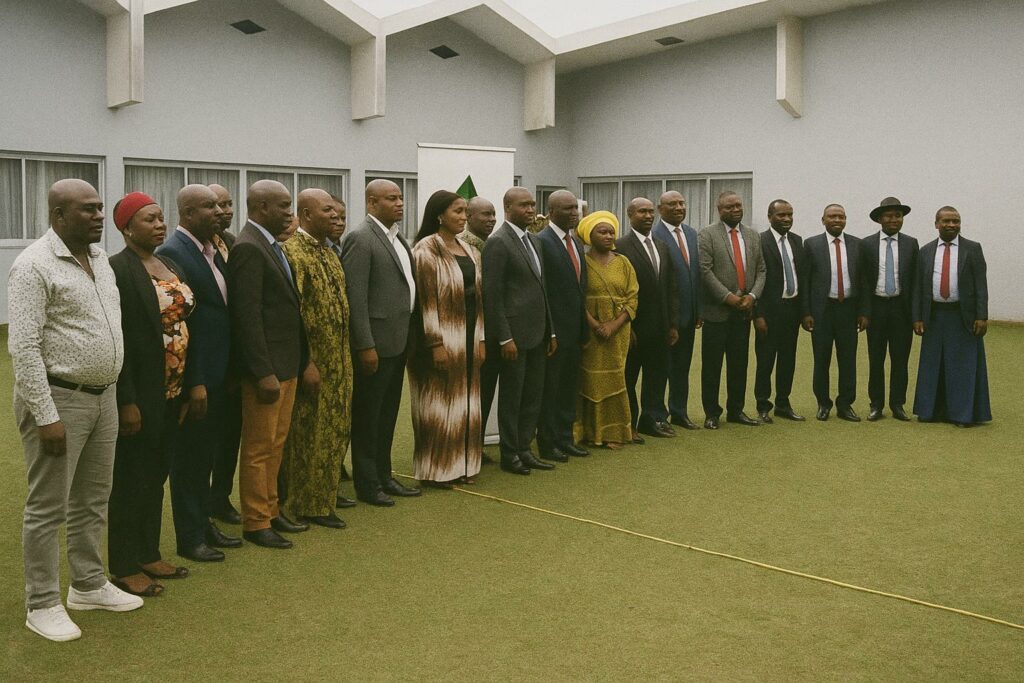Stakeholders Converge in Pointe-Noire
The port city of Pointe-Noire, long synonymous with offshore rigs and tanker traffic, briefly reinvented itself as a forum for energy diplomacy on 26–27 June. Convened by the Rencontre pour la Paix et les Droits de l’Homme (RPDH) and financially backed by Rockefeller Philanthropy Advisors with technical input from Energy Transition Fund, the consultation gathered representatives of the Kouilou departmental council, the municipality, line ministries, parliament, local communities and international observers. Although civil society hosted the event, high-ranking public officials such as Bienvenu Makosso Dangui and Philippes M’Boumba underscored the administration’s interest in the exercise, signalling that the conversation about a post-petroleum future is no longer confined to academic circles.
From Hydrocarbons to Hydropower and Beyond
Congo-Brazzaville’s macro-fiscal landscape remains anchored in hydrocarbons, which accounted for roughly 54 % of GDP and 80 % of export revenues in 2022 (African Development Bank, 2023). Yet hydrological surveys identify a theoretical hydroelectric potential of 3 GW along the Congo and Kouilou basins, while solar irradiation in the northern savannas averages 5,5 kWh/m²/day (International Renewable Energy Agency, 2022). Against this backdrop, speakers such as Akoua Maryse of the Departmental Directorate for Hydraulic Energy promoted a phased shift toward hydropower, complemented by modular solar grids for remote prefectures. Participants also flagged biomass residues from the timber sector and emerging green-hydrogen pilots as longer-term options, thus broadening the narrative beyond the conventional dam-centric model.
Political Will and Institutional Capacity
While applauding the intellectual ferment, RPDH coordinator Christian Mounzéo offered a frank reminder that policy blueprints often stumble at the implementation gate. Echoing his remarks, several deputies cited the necessity of sustained political stewardship, a theme consistent with the government’s existing 2022-2026 National Development Plan that already earmarks 30 % of public-investment envelopes for the green economy. The round-table therefore placed emphasis on capacity-building within regulatory agencies, transparent access to data and the harmonisation of fiscal incentives so that entrepreneurs in renewables enjoy a predictability comparable to their counterparts in the oil patch.
Regional and International Benchmarks
The dialogue situated Congo-Brazzaville within a continental movement that includes Namibia’s green-hydrogen strategy and Ghana’s gas-to-power transition. Experts referenced the Beyond Oil and Gas Alliance, noting that membership would align Brazzaville with countries committing to a managed decline of fossil-fuel extraction. Yet the room agreed that any pledge must be calibrated to local socio-economic realities. Delegates highlighted Norway’s phased divestment model and the United Arab Emirates’ sovereign-fund diversification as instructive precedents, illustrating how hydrocarbon revenues can seed renewable portfolios without abrupt shocks to employment.
Navigating Fiscal and Social Trade-offs
Deliberations did not sidestep the delicate balance between climate ambition and budgetary prudence. The Ministry of Finance’s observer estimated that replacing 15 % of current thermal generation with solar and mini-hydro would require capital outlays approaching 450 million USD over five years. Participants proposed a blended-finance mechanism leveraging multilateral guarantees and diaspora bonds, thereby limiting direct pressure on the treasury. Furthermore, labour-union representatives insisted that any roadmap include vocational-training programmes to pivot rig technicians toward electro-mechanical maintenance, forestalling potential job dislocations.
Next Steps on the Roadmap
The meeting culminated in a provisional matrix of actions: update the Renewable Energy Act to streamline licensing; commission a nationwide resource-mapping exercise; pilot three community-owned micro-grids in Kouilou; and establish an inter-ministerial steering committee reporting quarterly to the Prime Minister’s office. Over the coming year, Dr Jean Chrios Moukala’s team will consolidate stakeholder inputs into a draft national transition framework, to be tabled for cabinet review. Observers note that such a consultative trajectory mirrors President Denis Sassou Nguesso’s stated commitment to climate diplomacy, recently reaffirmed at the Three Basins Summit in Brazzaville.
As the oil market grapples with cyclical price volatility and structural decarbonisation headwinds, Congo-Brazzaville’s choice is no longer binary. The Pointe-Noire round-table suggests a willingness to evolve from an oil-dependent economy toward a diversified energy portfolio that preserves macroeconomic stability while honouring global climate imperatives. The path ahead will test administrative agility and investor confidence, yet the diplomatic choreography witnessed in June indicates that the Republic is positioning itself to navigate the transition on its own terms.

